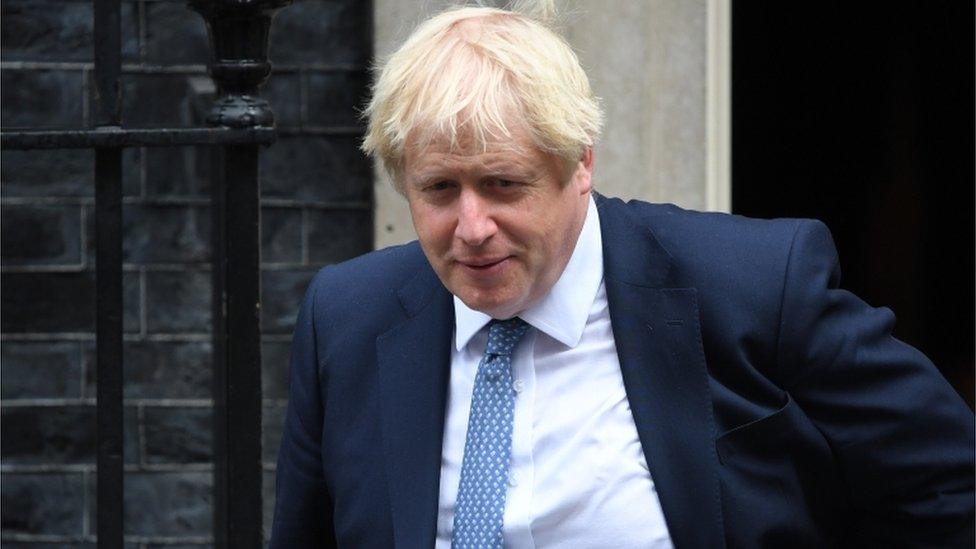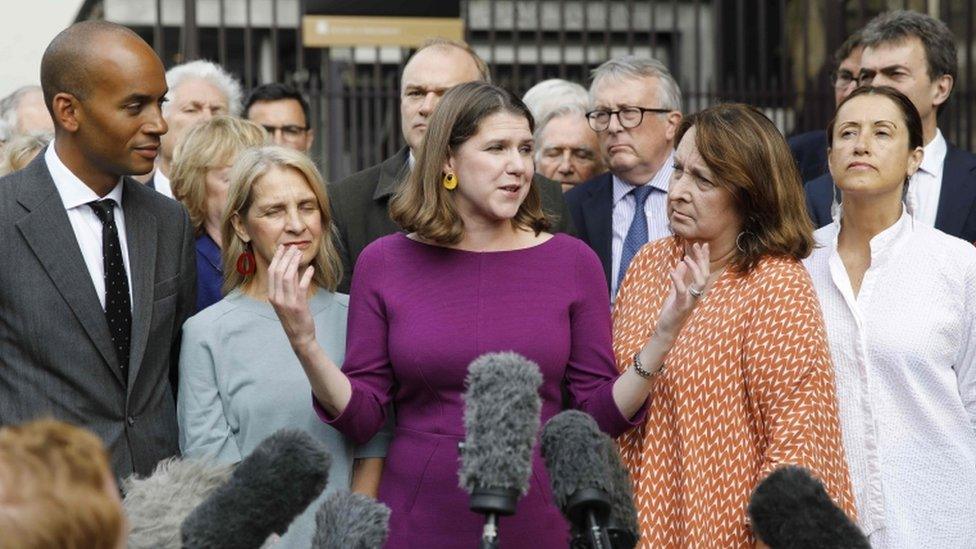Nicola Sturgeon 'open-minded' about interim prime minister
- Published
- comments
Nicola Sturgeon says she is "no fan" of Jeremy Corbyn but is "open minded" about who could lead a temporary government
Scotland's first minister has said she is "open-minded" about who might emerge to lead a temporary government if Boris Johnson is removed from office.
Nicola Sturgeon said she is "no fan" of Labour leader Jeremy Corbyn and is not pushing for him to become interim PM.
But she said opposition parties would need to compromise if they want to win a vote of no confidence in Mr Johnson.
And she warned that Mr Johnson could force through a no-deal Brexit unless the opposition acts.
Any attempt to install the Labour leader as a caretaker PM would likely need the support of the Liberal Democrats, the Independent Group for Change (IGC), Plaid Cymru and the 21 exiled Conservative MPs as well as Mr Corbyn's own party.
Lib Dem leader Jo Swinson has already said her party would not back the move, claiming that the Labour leader is "not fit to be prime minister" and is too divisive a figure to command enough support in the Commons.
Mr Johnson has said Brexit will happen on 31 October regardless of whether or not a fresh withdrawal agreement has been reached with Brussels.
MPs have approved a law known as the Benn Act which is aimed at forcing him to request an extension to Brexit negotiations beyond that date to avoid the country leaving without a deal.
Downing Street has consistently said the government will obey the law, but Mr Johnson has also insisted he will not seek a delay to Brexit.

Mr Johnson has vowed not to extend Brexit beyond 31 October
Mr Corbyn has previously said Labour would introduce a motion of no confidence aimed at removing the Conservative government from office and forcing a general election "when we can be confident of success".
If the government was to fall as a result of the vote, he would have 14 days to persuade enough MPs to allow him to head a temporary government that would extend the Brexit deadline before holding an election.
Ms Sturgeon and the SNP have always been open to the possibility of backing the Labour leader for the role, and there has been speculation that they are increasingly warming to the idea, external.
However, Ms Sturgeon told BBC Scotland on Friday: "I'm not pushing Jeremy Corbyn as interim PM or anybody else as interim PM. I'm no great fan of Jeremy Corbyn.
"My point is the opposition needs to act to get Boris Johnson - the most disreputable prime minister in my lifetime - out of office, stop a no deal and then, as quickly as possible, move to a general election."
Ms Sturgeon went on to say she was "open-minded" about who might emerge as an interim prime minister for "literally a matter of days" to secure an extension to the Brexit deadline before moving to a general election.
She added: "We are all going to have to compromise, we are all going to have to swallow our pride and put up with something for a matter of days to allow that to happen, and get on with it.
"The alternative is we leave a prime minister who has been shown this week alone to be untrustworthy and absolutely prepared to fall foul of the law and not respect the basic norms of democracy.
"I don't want any of us to be looking back at the end of October wishing we had acted."

Jo Swinson and her Liberal Democrat MPs have ruled out backing any proposal to install a temporary government headed by Mr Corbyn
BBC political correspondent Nick Eardley said he had been told by a senior SNP source that the party's MPs were prepared to put Mr Corbyn in 10 Downing Street "as soon as next week" to extend the Brexit deadline and call an election.
The source said: "We are more than willing to look at other options - but in the absence of anything else that's the way to do it."
The SNP's Westminster leader, Ian Blackford, said Mr Corbyn would have the first option to form an interim government, as he is the leader of the opposition, and added that: "I respect his right to be able to do that".
But Scottish Conservative MP Kirstene Hair claimed the SNP's aim was to "prop up Jeremy Corbyn in Number 10" in return for a second independence referendum.
And a Lib Dem spokesman said: "The question of whether or not we would support Corbyn in an emergency government is futile. He does not command the support of the House.
"Liberal Democrats are clear that we need to bring people together and find a candidate that can command the support of the House, and to push this disgraceful Conservative government out of office."
Allow X content?
This article contains content provided by X. We ask for your permission before anything is loaded, as they may be using cookies and other technologies. You may want to read X’s cookie policy, external and privacy policy, external before accepting. To view this content choose ‘accept and continue’.
Ms Sturgeon had earlier tweeted that she "agreed" with a suggestion made by journalist Sonia Sodha that the only "failsafe way" of ensuring an extension to Article 50, which would delay Brexit, if there was no deal would be "for opposition parties to pass a vote of no confidence and install Corbyn or someone else as PM".
Ms Sturgeon added: "Nothing is risk free, but leaving Johnson in post to force through no-deal - or even a bad deal - seems like a terrible idea to me."
However, she later tweeted a clarification, external that: "The point I'm making is not really about who it should be - I'm open minded on that - more that the opposition needs to unite behind a plan and act".
Mr Corbyn held cross-party talks in his Westminster office on Thursday over fears Mr Johnson will refuse to ask the EU for an extension as required by the Benn Act.
The Labour leader spoke with Mr Blackford, Ms Swinson, the Independent Group for Change's Anna Soubry and Plaid Cymru's Liz Saville-Roberts.
Earlier this week, the Supreme Court ruled the government's prorogation - or suspension - of Parliament for five weeks was "unlawful".
Critics accused the prime minister of trying to stop MPs scrutinising his Brexit plans, arguing that the suspension was far longer than necessary.
The prime minister insisted he wanted to prorogue Parliament to outline the government's policies in a Queen's Speech.
What is a vote of no confidence?
A motion of no confidence in Parliament allows MPs to hold a vote on whether they want the government to continue - and it has the power to trigger a general election.
If the government loses the vote, MPs have 14 days to express their support for an alternative government.
If an alternative government cannot command a majority in the House of Commons in that time, a general election could be held.
MPs opposed to a no-deal Brexit have previously considered passing a vote of no confidence in the government, but there has not been a clear consensus on who would replace Boris Johnson as prime minister.
Mr Corbyn has said he would be "ready to serve" as prime minister but Lib Dems and former Conservative MPs have so far been reluctant to support him.
In August, Lib Dem leader Jo Swinson suggested senior Tory MP Ken Clarke or former deputy Labour leader Harriet Harman could act as caretaker prime minister.